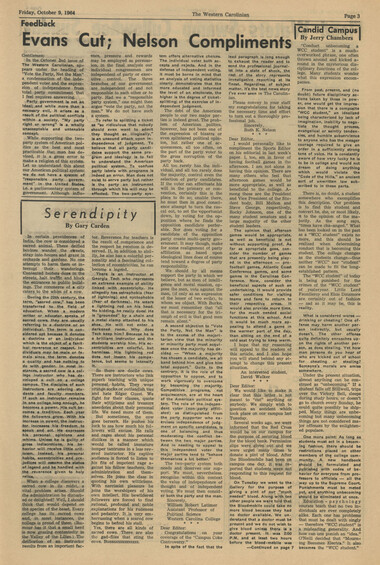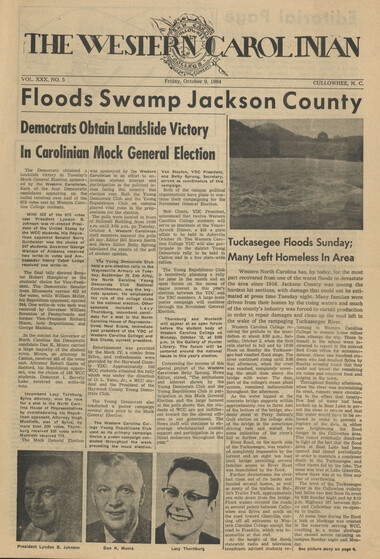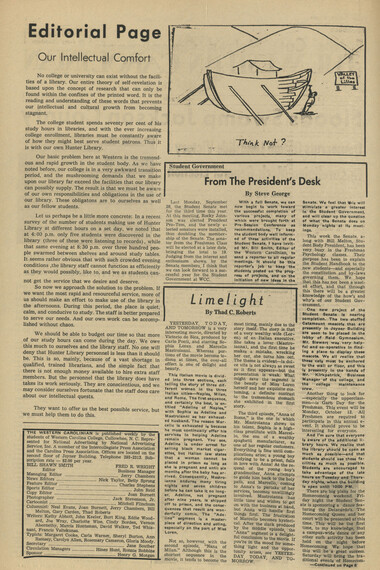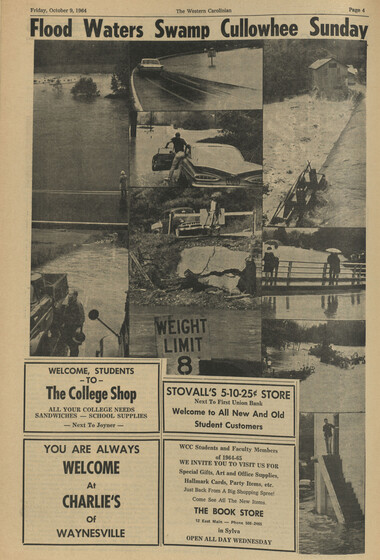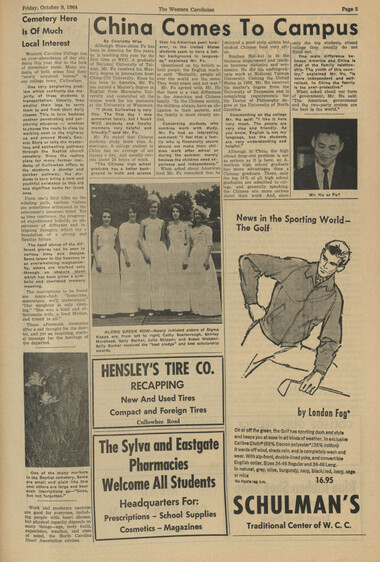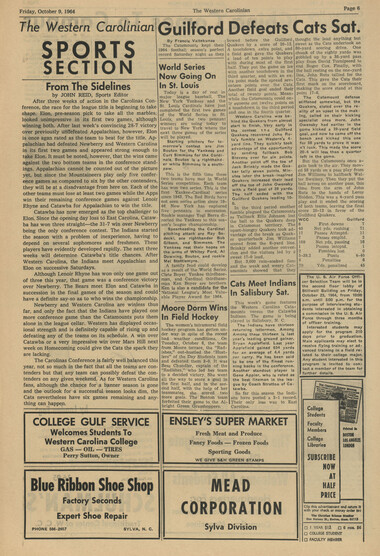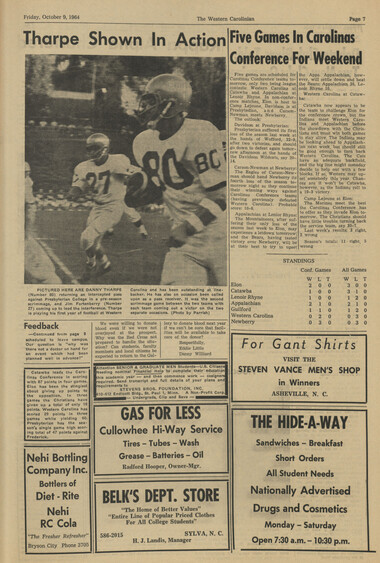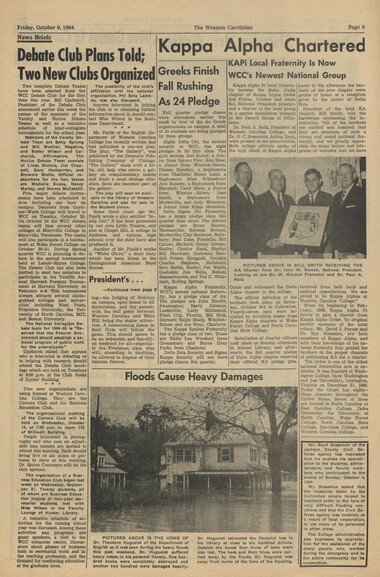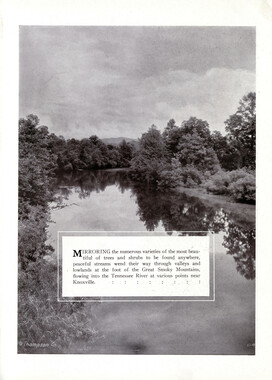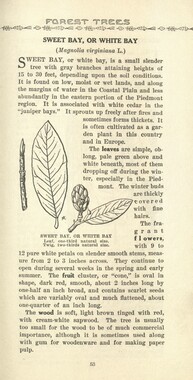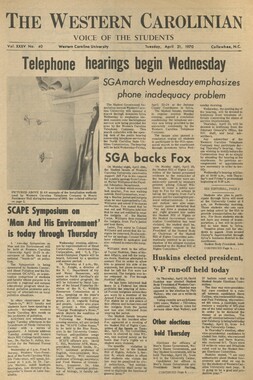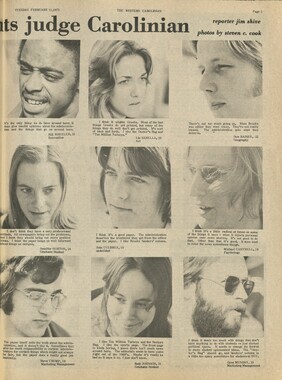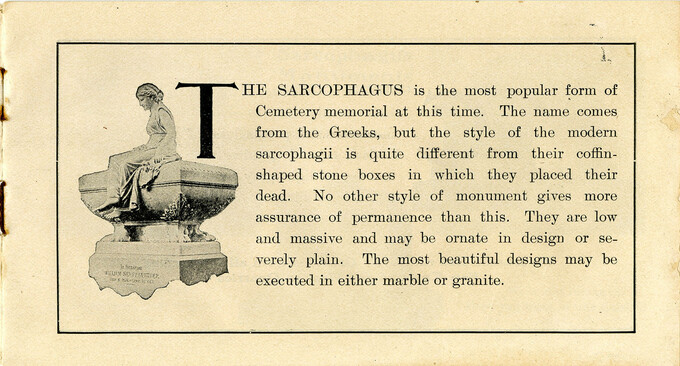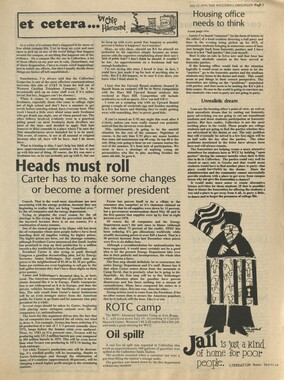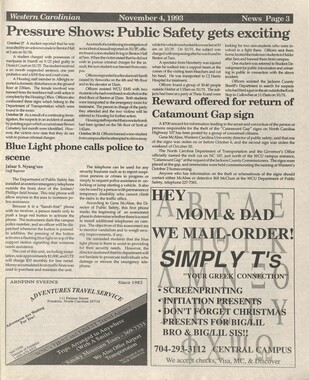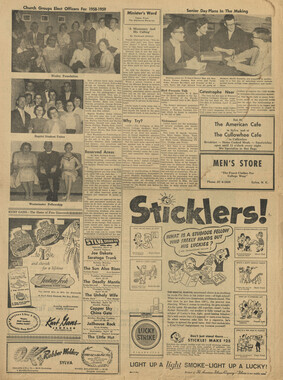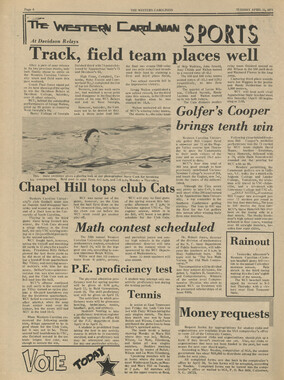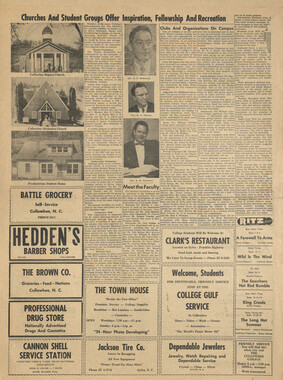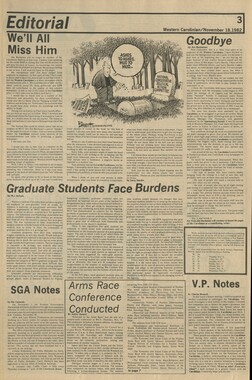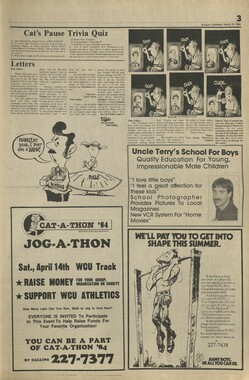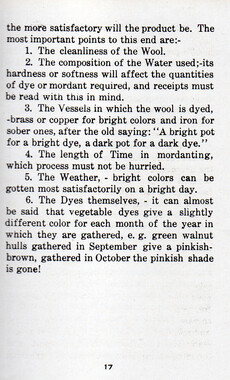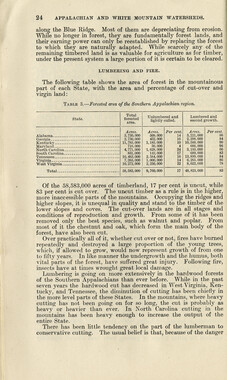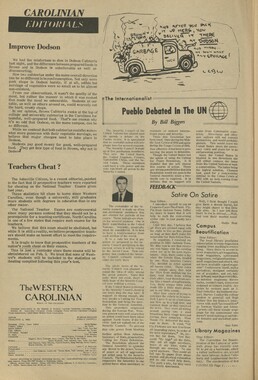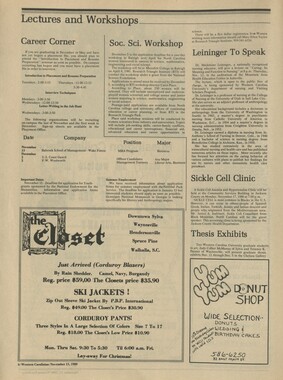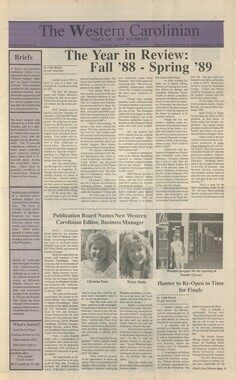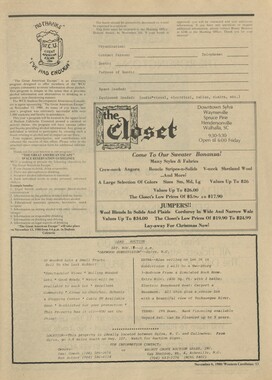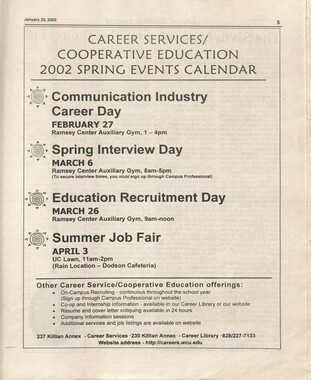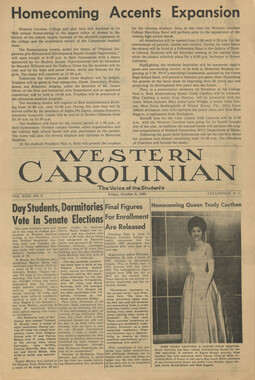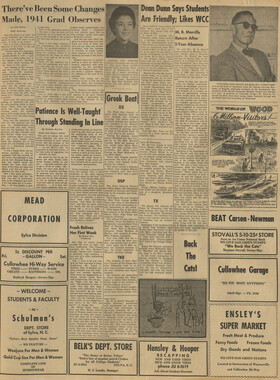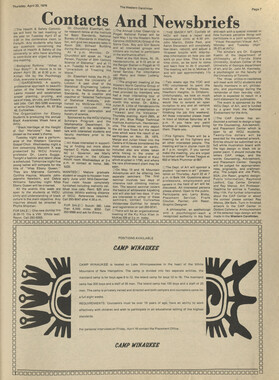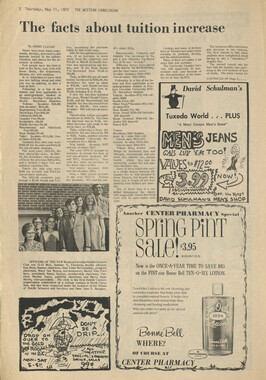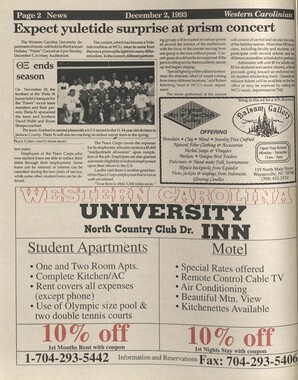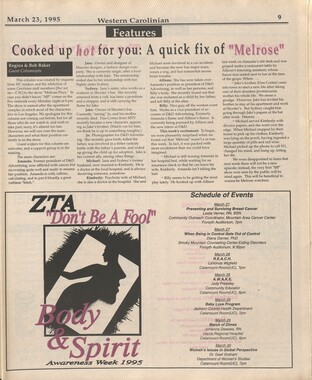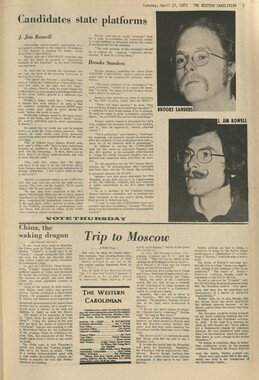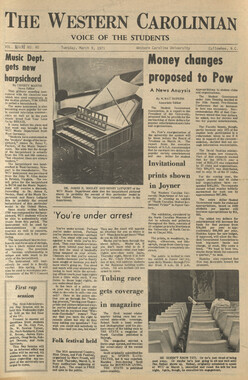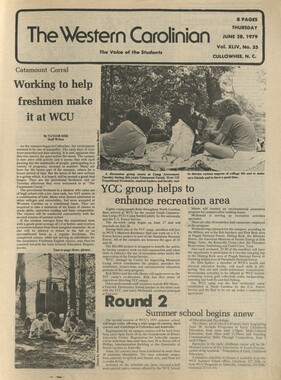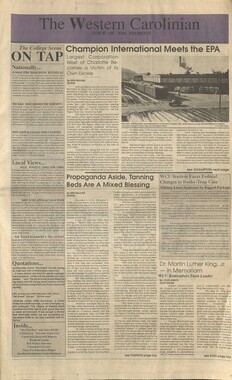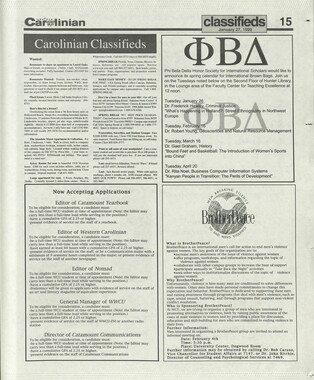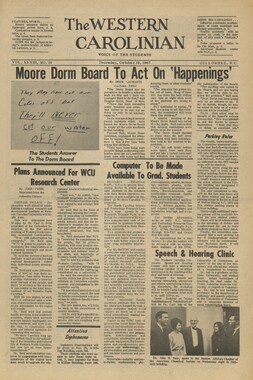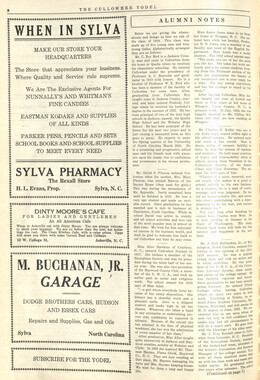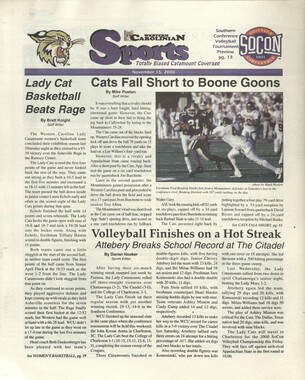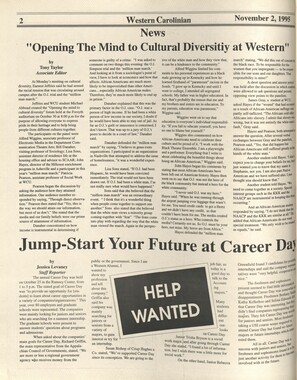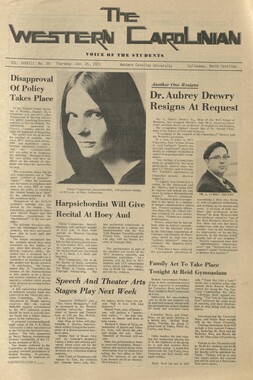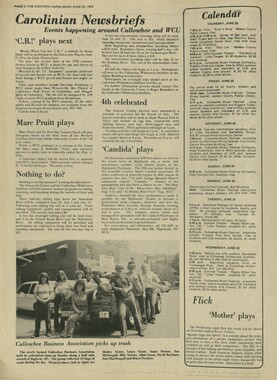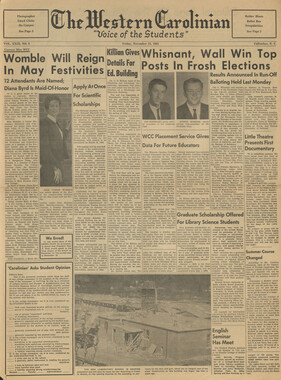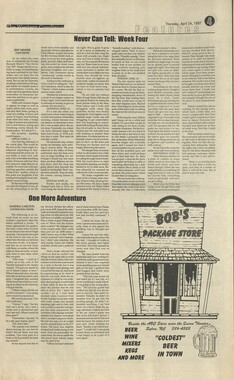Western Carolina University (20)
View all
- Canton Champion Fibre Company (2308)
- Cherokee Traditions (292)
- Civil War in Southern Appalachia (165)
- Craft Revival (1942)
- Great Smoky Mountains - A Park for America (2766)
- Highlights from Western Carolina University (430)
- Horace Kephart (941)
- Journeys Through Jackson (154)
- LGBTQIA+ Archive of Jackson County (85)
- Oral Histories of Western North Carolina (314)
- Picturing Appalachia (6772)
- Stories of Mountain Folk (413)
- Travel Western North Carolina (160)
- Western Carolina University Fine Art Museum Vitreograph Collection (129)
- Western Carolina University Herbarium (92)
- Western Carolina University: Making Memories (708)
- Western Carolina University Publications (2283)
- Western Carolina University Restricted Electronic Theses and Dissertations (146)
- Western North Carolina Regional Maps (71)
- World War II in Southern Appalachia (131)
University of North Carolina Asheville (6)
View all
- Allanstand Cottage Industries (62)
- Appalachian National Park Association (53)
- Bennett, Kelly, 1890-1974 (1388)
- Berry, Walter (76)
- Brasstown Carvers (40)
- Carver, George Washington, 1864?-1943 (26)
- Cathey, Joseph, 1803-1874 (1)
- Champion Fibre Company (233)
- Champion Paper and Fibre Company (297)
- Cherokee Indian Fair Association (16)
- Cherokee Language Program (22)
- Crowe, Amanda (40)
- Edmonston, Thomas Benton, 1842-1907 (7)
- Ensley, A. L. (Abraham Lincoln), 1865-1948 (275)
- Fromer, Irving Rhodes, 1913-1994 (70)
- George Butz (BFS 1907) (46)
- Goodrich, Frances Louisa (120)
- Grant, George Alexander, 1891-1964 (96)
- Heard, Marian Gladys (60)
- Kephart, Calvin, 1883-1969 (15)
- Kephart, Horace, 1862-1931 (313)
- Kephart, Laura, 1862-1954 (39)
- Laney, Gideon Thomas, 1889-1976 (439)
- Masa, George, 1881-1933 (61)
- McElhinney, William Julian, 1896-1953 (44)
- Niggli, Josephina, 1910-1983 (10)
- North Carolina Park Commission (105)
- Osborne, Kezia Stradley (9)
- Owens, Samuel Robert, 1918-1995 (11)
- Penland Weavers and Potters (36)
- Roberts, Vivienne (15)
- Roth, Albert, 1890-1974 (142)
- Schenck, Carl Alwin, 1868-1955 (1)
- Sherrill's Photography Studio (2565)
- Southern Highland Handicraft Guild (127)
- Southern Highlanders, Inc. (71)
- Stalcup, Jesse Bryson (46)
- Stearns, I. K. (213)
- Thompson, James Edward, 1880-1976 (226)
- United States. Indian Arts and Crafts Board (130)
- USFS (683)
- Vance, Zebulon Baird, 1830-1894 (1)
- Weaver, Zebulon, 1872-1948 (58)
- Western Carolina College (230)
- Western Carolina Teachers College (282)
- Western Carolina University (1794)
- Western Carolina University. Mountain Heritage Center (18)
- Whitman, Walt, 1819-1892 (10)
- Wilburn, Hiram Coleman, 1880-1967 (73)
- Williams, Isadora (3)
- Cain, Doreyl Ammons (0)
- Crittenden, Lorraine (0)
- Rhodes, Judy (0)
- Smith, Edward Clark (0)
- Appalachian Region, Southern (2569)
- Asheville (N.C.) (1923)
- Avery County (N.C.) (26)
- Blount County (Tenn.) (161)
- Buncombe County (N.C.) (1672)
- Cherokee County (N.C.) (283)
- Clay County (N.C.) (555)
- Graham County (N.C.) (233)
- Great Smoky Mountains National Park (N.C. and Tenn.) (519)
- Haywood County (N.C.) (3524)
- Henderson County (N.C.) (70)
- Jackson County (N.C.) (4694)
- Knox County (Tenn.) (25)
- Knoxville (Tenn.) (12)
- Lake Santeetlah (N.C.) (10)
- Macon County (N.C.) (420)
- Madison County (N.C.) (212)
- McDowell County (N.C.) (39)
- Mitchell County (N.C.) (132)
- Polk County (N.C.) (35)
- Qualla Boundary (981)
- Rutherford County (N.C.) (76)
- Swain County (N.C.) (2115)
- Transylvania County (N.C.) (270)
- Watauga County (N.C.) (12)
- Waynesville (N.C.) (84)
- Yancey County (N.C.) (72)
- Aerial Photographs (3)
- Aerial Views (60)
- Albums (books) (4)
- Articles (1)
- Artifacts (object Genre) (228)
- Bibliographies (1)
- Biography (general Genre) (2)
- Cards (information Artifacts) (38)
- Clippings (information Artifacts) (191)
- Crafts (art Genres) (622)
- Depictions (visual Works) (21)
- Design Drawings (1)
- Drawings (visual Works) (184)
- Envelopes (73)
- Facsimiles (reproductions) (1)
- Fiction (general Genre) (4)
- Financial Records (12)
- Fliers (printed Matter) (67)
- Glass Plate Negatives (381)
- Guidebooks (2)
- Internegatives (10)
- Interviews (815)
- Land Surveys (102)
- Letters (correspondence) (1013)
- Manuscripts (documents) (618)
- Maps (documents) (177)
- Memorandums (25)
- Minutes (administrative Records) (59)
- Negatives (photographs) (5835)
- Newsletters (1285)
- Newspapers (2)
- Occupation Currency (1)
- Paintings (visual Works) (1)
- Pen And Ink Drawings (1)
- Periodicals (193)
- Personal Narratives (10)
- Photographs (12976)
- Plans (maps) (1)
- Poetry (6)
- Portraits (4533)
- Postcards (329)
- Programs (documents) (151)
- Publications (documents) (2236)
- Questionnaires (65)
- Scrapbooks (282)
- Sheet Music (2)
- Slides (photographs) (402)
- Songs (musical Compositions) (2)
- Sound Recordings (796)
- Specimens (92)
- Speeches (documents) (15)
- Tintypes (photographs) (8)
- Transcripts (322)
- Video Recordings (physical Artifacts) (23)
- Vitreographs (129)
- Text Messages (0)
- A.L. Ensley Collection (275)
- Appalachian Industrial School Records (7)
- Appalachian National Park Association Records (336)
- Axley-Meroney Collection (2)
- Bayard Wootten Photograph Collection (20)
- Bethel Rural Community Organization Collection (7)
- Blumer Collection (5)
- C.W. Slagle Collection (20)
- Canton Area Historical Museum (2110)
- Carlos C. Campbell Collection (282)
- Cataloochee History Project (64)
- Cherokee Studies Collection (4)
- Daisy Dame Photograph Album (5)
- Daniel Boone VI Collection (1)
- Doris Ulmann Photograph Collection (112)
- Elizabeth H. Lasley Collection (1)
- Elizabeth Woolworth Szold Fleharty Collection (4)
- Frank Fry Collection (95)
- George Masa Collection (173)
- Gideon Laney Collection (452)
- Hazel Scarborough Collection (2)
- Hiram C. Wilburn Papers (28)
- Historic Photographs Collection (236)
- Horace Kephart Collection (861)
- Humbard Collection (33)
- Hunter and Weaver Families Collection (1)
- I. D. Blumenthal Collection (4)
- Isadora Williams Collection (4)
- Jesse Bryson Stalcup Collection (47)
- Jim Thompson Collection (224)
- John B. Battle Collection (7)
- John C. Campbell Folk School Records (80)
- John Parris Collection (6)
- Judaculla Rock project (2)
- Kelly Bennett Collection (1407)
- Love Family Papers (11)
- Major Wiley Parris Civil War Letters (3)
- Map Collection (12)
- McFee-Misemer Civil War Letters (34)
- Mountain Heritage Center Collection (4)
- Norburn - Robertson - Thomson Families Collection (44)
- Pauline Hood Collection (7)
- Pre-Guild Collection (2)
- Qualla Arts and Crafts Mutual Collection (12)
- R.A. Romanes Collection (681)
- Rosser H. Taylor Collection (1)
- Samuel Robert Owens Collection (94)
- Sara Madison Collection (144)
- Sherrill Studio Photo Collection (2558)
- Smoky Mountains Hiking Club Collection (616)
- Stories of Mountain Folk - Radio Programs (374)
- The Reporter, Western Carolina University (510)
- Venoy and Elizabeth Reed Collection (16)
- WCU Gender and Sexuality Oral History Project (32)
- WCU Mountain Heritage Center Oral Histories (25)
- WCU Oral History Collection - Mountain People, Mountain Lives (71)
- WCU Students Newspapers Collection (1744)
- Western North Carolina Tomorrow Black Oral History Project (69)
- William Williams Stringfield Collection (2)
- Zebulon Weaver Collection (109)
- African Americans (390)
- Appalachian Trail (35)
- Artisans (521)
- Cherokee art (84)
- Cherokee artists -- North Carolina (10)
- Cherokee language (21)
- Cherokee pottery (101)
- Cherokee women (208)
- Church buildings (170)
- Civilian Conservation Corps (U.S.) (110)
- College student newspapers and periodicals (1830)
- Dams (107)
- Dance (1023)
- Education (222)
- Floods (61)
- Folk music (1015)
- Forced removal, 1813-1903 (2)
- Forest conservation (220)
- Forests and forestry (1184)
- Gender nonconformity (4)
- Great Smoky Mountains National Park (N.C. and Tenn.) (181)
- Hunting (38)
- Landscape photography (25)
- Logging (118)
- Maps (83)
- Mines and mineral resources (8)
- North Carolina -- Maps (18)
- Paper industry (38)
- Postcards (255)
- Pottery (135)
- Railroad trains (71)
- Rural electrification -- North Carolina, Western (3)
- School integration -- Southern States (2)
- Segregation -- North Carolina, Western (5)
- Slavery (5)
- Sports (452)
- Storytelling (244)
- Waterfalls -- Great Smoky Mountains (N.C. and Tenn.) (66)
- Weaving -- Appalachian Region, Southern (280)
- Wood-carving -- Appalachian Region, Southern (328)
- World War, 1939-1945 (173)
Western Carolinian Volume 30 Number 05
Item
Item’s are ‘child’ level descriptions to ‘parent’ objects, (e.g. one page of a whole book).
-
-
Friday, October 9, 1964 The Western Carolinian Page 3 Feedback Evans Cut; Nelson Compliments Candid Campus I By Jerry Chambers "Conduct unbecoming WCC student" is a much a Gentlemen: In the OctoDer 2nd issue of The Western Carolinian, appears under the heading of "Vote the Party, Not the Man" a condemnation of the independent voter and the expression of independence from total party commitment that I feel requires answering. Party government Is not an Ideal; and while more than a necesary evil, it arises as a result of the political conflicts within a society. "My party right or wrong" Is a wholly unacceptable and untenable concept. While supporting the two- party system of American politics as the best and most practicable that man has devised, it is a gross error to make a religion of this system. Let us understand this about our American political system: we do not have a system of "responsible party government" in the United States, Le. a parliamentary system of government. Although influ ence, pressure and rewards may be employed as persuasion, in the final analysis our individual congressmen are independent of party or executive control. The three branches of our government are independent of and not responsible to each other or to party. Had we a "responsible party system," one might then argue "vote the party, not the man." We do not have such a system. To refer to splitting a ticket as "so ridiculous that nobody should even want to admit they thought so illogically.*' Is an unsound attack upon Independence of Judgment. To believe that all party candidates support the same program and Ideology Is to fail to understand the American political system. To confuse party labels with programs Is Indeed an error. Man does not exist to serve party but rather Is the party an instrument through which his will may be effected. The two-party sys- s erendip ity By Gary Carden In certain providences of India, the cow is considered a sacred animal. These deified bovines wander the streets, stray into houses and graze in orchards and gardens. No one attempts to harm them or interrupt their wanderings. Contented heifers doze in the streets, halt traffic and block the entrances to public buildings. The commerce of a city caters to the whim of a cow. During the 20th century, the term, "sacred cow," has been transferred to the field of education. When a modern writer or educator speaks of sacred cows, they are usually referring to a doctrine or an individual. The term is considered apt because it denotes a doctrine or an individual which is the object of a fan it- leal reverence or respect. Individuals may be male or female since the term denotes a quality and has nothing to do with gender. In most instances, a sacred cow is a college instructor who has developed a cult on a college campus. The disciples of such instructors are adoring students and faculty members. If such an instructor remains in one college long enough, he becomes a power. His cult becomes a tradition. Each year the followers grow. With his increase in power, the instructor increases his freedom to speak and act. He expresses his personal opinions and whims. Unless he is guilty of gross indiscretions, his behavior will receive little criticism. Instead, his personal habits, eccentricities and prejudices will assume the status of legend and be handled with the reverence given to holy relics. When a college discovers a sacred cow in its midst, a vital problem arises. Should the administration be disturbed or delighted? Well, I should think that would depend on the species of the beast. Every college has its sacred cows and, in most instances, the college is proud of them. (Rumour has it that a small herd is now grazing contentedly in the Valley of the Lilies.) The deification of an instructor results from an important fac tor. Reverence for teachers is the result of competence and the respect he receives is deserved. If, in addition to ability, he also has a colorful personality and a fascinating collection of eccentricities, he can become a legend. There Is an instructor at Georgia Tech who represents an extreme example of ability linked with eccentricity. He allegedly has astraphobia (fear of lightning) and nyctophobia (fear of darkness). He wears a lightning rod on his head. No kidding, he really doesl He is "grounded" by a chain and a metal clamp attached to his shoe. He will not enter a darkened room. Why dees Tech keep him? Because he is a brilliant instructor and the students worship him. His eccentricities are colorful, but harmless. His lightning rod does not lessen his competence, but seems to intensify it. So there are docile cows. There are instructors who link superb teaching with unique personal habits. They wear orange socks or outlandish ties and hate Edgar Guest. We fight for their classes, quote their witticisms and treasure anecdotes about their personal life. We need more of them. But sometimes, the cow goes berserk. He pushes his luck to see how much his followers will excuse. He rails and rages about his personal dislikes in a manner which would be called immature temper tantrums in a less revered instructor. His captive audience is forced to listen to his fits of impotent rage a- gainst his fellow teachers, the administration and themselves. He joins the class in quoting his own witticisms. With narcissist pleasure he joins the worshipers of his own intellect. His bewildered followers are forced to find rational, profound and noble explanations for his rudeness and pedantry. It is very embarrassing when a scared cow begins to befoul his stall. Yes, there are all kinds of sacred cows. There are also the gad-flies that sting the cows. Buzzzzzzzzzzzzzzz. tern offers alternative choices. The individual voter both accepts and rejects. And in the defense of independent voting, it must be borne in mind that an analysis of voting statistics clearly demonstrates that the more educated and informed the level of an electorate, the higher is the degree of ticket- splitting; of the exercise of independent judgment. The debt of the American people to our two major parties is indeed great. The problem of American politics, however, has not been one of the expression of bizarre or even splintered political opinion, but rather one of acquiescence, all too often, on the part of the party voter to the gross corruption of the party hack. All too rarely has the individual, and all too rarely does the majority, control even the selection of party candidates. If the voter can effectuate his will in the primary or convention, certainly this is the place to do so; unable there, he must then in good conscience attempt to turn the rascal out, to set the ^opportunist down, by voting for the opposition where he finds the opposition candidate perfer- able. Nor does voting for a candidate of the opposition party create multi-party government. It may though, make for some realignment of party affiliation as based upon ideological lines does of course tend toward a degree of party responsibility. We should by all means support the party in which we believe, but as men of intelligence and moral suasion, oppose the man, vote against the man, (if only as an expression of the lesser of two evils), to whom we object. With Burke, we must remember that "all that is necessary for the triumph of evil is that good men remain silent." A second objection to "Vote the Party, Not the Man" is to the excess of the majori- tarian view that the minority or minority party must acquiesce once the majority has decided — "When a majority has chosen a candidate, we all band behind him and give him total support." Quite to the contrary, it is the role of the opposition to oppose, and to work vigorously to overcome by becoming the majority. Competitive programs, not acquiescence, are at the heart of the American political system. The role of the independent voter (non-party affiliated) as distinguished from the party supporter who exercises independence of judgment on specific candidates, is one of balancing and thus moderating the conflict between the two major parties. And in needing to appeal to this independent voter the major parties tend to "behave themselves a bit better." The two-party system both needs and deserves our support. We must, nevertheless, recognize within this context the value of independence of thought and of independent voting. We must then consider both the party and the man. Sincerely, William Robert Latimer Assistant Professor of Political Science Western Carolina College * » * Dear Editor: Congratulations on your coverage of the "Campus Coke Controversy." In spite of the fact that the lead paragraph is long enough to exhaust the reader and to send the professional Journalist into a state of shock, the rest of the story represents investigative reporting at its finest. Regardless of subject matter, it's the best news story I've ever seen in The Carolinian. Please convey to your staff my congratulations for taking the necessary time and effort to turn out a thoroughly professional job. Sincerely, Ruth K. Nelson • • * Dear Editor, I would personally like to compliment the Sports Editor on his editorial in last week's paper. I, too, am in favor of having football games in the afternoon. I am not alone in having this opinion. There are many others who feel that afternoon games would be more appropriate, as well as beneficial to the college. A- mong these are the President and Vice President of the Student body, Bill Melton and Steve George, respectively, Rocky Johnson, one of the many student senators and a large majority of the other student leaders. The opinion that afteroon games would be appropriate, as well as beneficial Is not without supporting proof. As far as apropriate goes, consider the number of games that are presently being played in the afternoon — pro- football games, Atlantic Coast Conference games, and some games in the Carolinas Conference. Now, consider the beneficial aspects of such an undertaking. It would provide safer conditions for visiting teams and fans to return to their respective areas. It would also provide more time, for the much needed social functions at this school. And it would be much more appealing to attend a game in the warmer part of the day, than sitting on the end of a cold seat trying to keep warm. I hope that my reasoning will appeal to the readers of this article, and I also hope you will stand behind any attempt to change this present situation. An interested student, David Walker * * * Dear Editor: We would like to make it clear that this letter is not meant to "cut" anything or anybody. We simply wish to question an accident which took place on our campus last Tuesday. Several weeks ago, we were informed that the Red Cross would be on our campus for the purpose of securing blood for the blood bank. Permission slips were given out and we were urged many times to donate a pint of blood. After the Bloodmobile had been on campus one day, it was reported that students were not responding to this request for blood. On Tuesday we went to the Gallery for the purpose of giving a pint of our "much needed" blood. Along with ten other people we were told that the Bloodmobile could take no more blood because they had no doctor available. We understand that a doctor must be present and we do not wish to give blood unless there is a doctor present. It was 2:00 P.M. and at least two hours before the blood-mobile was —Continued on page 7 overworked phrase, one often thrown around and kicked a- round in the mysterious disciplinary functions of the college. Many students wonder what this expression encompasses. From past, present, and (no doubt) future disciplinary actions taken by those in power, one would get the impression that there Is a composite "WCC student," an idealized being characterized by lack of imagination, inability to negotiate the thought process, evangelical or saintly tendencies, and humble subservience to anyone who has the meager courage required to give an order in a sufficiently strong tone of voice. He Is constantly aware of how very lucky he is to be in college and would not dream of doing anything which would violate the "Code of the Hills," an ancient sort of unwritten law subscribed to In these parts. There is, no doubt, a student somewhere who exemplifies this description. Our problem is to find this student and convert he, she, or most likely, it to the opinion of the majority. As the song says, "times have cha-anged." What has been looked on in the past as a "WCC student" exists no more, and this should be realized when determining conduct that is becoming this student. The college changes as the students change—thus neither "WCC" nor "student" can be made to fit the long- established pattern. The "WCC student" of today is being punished for the crimes of the "WCC student" of yesteryear. Little Lord Fauntleroy and Elsie Dinsmore are certainly out of fashion — sad as it may be, this is reality. What is considered worse — drinking or cheating? One offense may harm another person indirectly, but usually doesn't. The other offense quite definitely enroaches upon the rights of another person, as does stealing. Yet how man persons do you hear of who are kicked out of school for cheating or stealing? Someone's morals are amiss somewhere. Under the present situation, almost anything can be construed as "unbecoming." If a student falls off Stillwell, trips over the Victory Bell, sleeps during study hours, or doesn't go to church every Sunday, he could quite possibly be shipped. Many things are unbecoming but many unbecoming things are not considered major offenses by the enlightened populace. One more point: As long as students must act in a becoming fashion, there should be restrictions placed on other members of th$ college community. A new handbook should be formulated and published with codes of behavior for everyone from professors to officials — all the way up to the Supreme Court- Punishments must be meted out, and anything unbecoming should be eliminated at once. Education - psychology courses teach that no two individuals are ever completely alike. Each one has problems that must be dealt with singly — therefore "WCC student" is a misleading generality. And how can one punish an "idea." O'Neill decided that "Mourning Becomes Electra." It also becomes the "WCC student."
Object
Object’s are ‘parent’ level descriptions to ‘children’ items, (e.g. a book with pages).
-
The Western Carolinian is Western Carolina University’s student-run newspaper. The paper was published as the Cullowhee Yodel from 1924 to 1931 before changing its name to The Western Carolinian in 1933.
-
